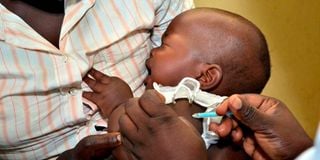Antibody weapon against malaria shows promise

A baby receives her second dose of malaria vaccine at Ndhiwa Sub-County Hospital in Homa Bay County on April 16, 2021.
What you need to know:
- Malaria killed more than 620,000 people in 2020 and sickened 241 million, mainly children under five in Africa.
- In Kenya, malaria is a significant public health issue. Approximately 75 percent of Kenyans are at risk for malaria because of altitude, rainfall patterns, and temperature.
Researchers in Africa have found that a one-time dose of an experimental drug protected adults against malaria for at least six months.
A study published on The New England Journal of Medicine showed a single dose of lab-produced monoclonal antibodies can protect recipients from infection for up to six months during an intense malaria season in Mali. Monoclonal antibodies that target parasites and have shown success in the lab shielded people in Mali from illnesses in their first real-world test.
Rather than relying on the immune system to produce enough of those same infection-blocking antibodies following vaccination, the latest trial attempted a totally different strategy that involved giving participants a large dose of lab-made antibodies designed to fight malaria.
“It’s the first time [scientists] have brought a malaria monoclonal to the field. And it was highly successful,” said Kirsten Lyke, a vaccinologist at the University of Maryland School of Medicine who conducted laboratory tests of the antibody.
The parasites that cause malaria have become resistant to a variety of medications, and the mosquitoes that transmit the disease have evolved to resist several insecticides.
A GSK vaccination is currently being distributed after receiving World Health Organization approval last year. However, it offers just average protection.
A different one created at the University of Oxford hasn’t yet proven it can offer long-lasting protection.
Malaria killed more than 620,000 people in 2020 and sickened 241 million, mainly children under five in Africa.
The World Health Organization is rolling out the first authorised malaria vaccine for children, but it is about 30 per cent effective and requires four doses.
In Kenya, malaria is a significant public health issue. Approximately 75 percent of Kenyans are at risk for malaria because of altitude, rainfall patterns, and temperature. Over half of outpatient visits in the eight priority counties sponsored by the US President’s Malaria Initiative are related to the disease, which accounts for at least 13 percent of outpatient consultations nationwide.





